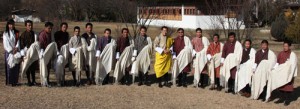Bhutanese monarch Vs free press
According to a report in government-controlled Kuensel online, the media foundation is being established to support the development of mass media, so that it can carry out its roles and responsibilities in the interest of democracy.
Kuensel in its online version further stated that the foundation will support the sustainability and growth of newspapers and broadcast stations, journalists associations and press clubs. It will also invest in the future readership of the print media by striving to provide subscription grants of all newspapers to the lower, middle and higher secondary schools and colleges in the country.
The Bhutanese government often claims that there is media freedom in the country; yet there are instances as mentioned above to prove that the rulers are trying to keep their hold in the media sector. Such an initiative under King’s direct influence can be read as “threat to the existence of independent media body’ in the country.

Junior Jigme with representatives of the print and broadcast media at Lingkana palace. Photo: Kuensel
The foundation is endowed with a seed grant of Nu 15 mn from the King. This is an attempt to bring the media under the King’s direct control. The investment of the ruler, whose commitment to people’s democracy in the country is yet to be seen, in media sector pose obvious doubt as to whether Bhutanese media sector would gain “independency” ever.
In a brief telephone response to the writer of the piece, Hari Prasad Adhikari, former National Assembly member of Bhutan, who is now in USA, termed the initiative as ‘King’s foundation’. “Such a foundation is nothing but one of the apex bodies to bring media under regime’s direct control.”
Terming the development in media sector in Bhutan, mainly after democratization process, as a progressive one, Ichha Poudyel, Australia-based editor of Radio Bhutan Online says “In one hand, establishment of media foundation is a good beginning at the end of the century in which media was regime-controlled. However, I doubt if it can function freely as the ball keeps rolling at King’s court.”
By now media independency in the country has been felt by emerging journalists in Bhutan. It was gradually taking its pace, for instance, citing interference by the management, the editor and the half of the entire reporters of the Bhutan’s first private newspaper, ‘Bhutan Times’ (BT) tendered resignation on October 23, 2009.
The resignation letter seems clear enough to reveal the management’s persistent anti-ethical pressure to screw-up the journalists’ pens and mouth piece the public media for the interest of an individual or a limited group. Editor of the BT, Gopi Lal Acharya, in his resignation had mentioned that to protect the independent journalism in Bhutan and keep up the professional values and principals of journalists primarily caused him and his newsroom staff to end up in resination.
There is no room to believe that the Bhutan Media Foundation would pave a way for free press in the country when already the King is aware to the fact that even the right of the public to freedom of speech and expression in the country is at farce despite their claim that Bhutan already stepped into the democratization process. Even now, hardly they let public to criticize government’s activities.
Announcement of ‘royal decree’ by rulers, for sure, at times have proven to be indirect endeavor to embrace strong political power on their hands. Decrees are often announced above the constitution—Bhutan being not an exception to this fact.
For Kazi Gautam, the former Chief Editor of refugee-run The Bhutan Reporter monthly, the declaration of Foundation is a diplomatic tactics to create a sense of fear and persecution among the journalists in the country deserving independence in media sector. “This is something serious to think upon by journalists working inside the country.”
The Foundation is established at a time when press in Bhutan is undergoing transition phase after the country saw the first general election in March 2008,which the regime had termed ‘historical’. Thus, all those favoring guarantee of media freedom in Bhutan should read the initiative between the lines.
General Secretary of the Association of Press Freedom Activists (APFA-Bhutan) Vidhyapati Mishra calls upon the international media groups to see the other side of the state of media in Bhutan. “I hope and request the concerned international media bodies that such a politically-motivated Foundation should not receive any kind of support.” Mishra also alerts journalists in Bhutan to react strongly towards such initiative of the King.
Stating that his organization would never support such a move, Teju Chouhan, the general secretary of the Bhutan Chapter of Third World Media Network (TWMN) said “In Bhutanese history, media sector has been under the regime’s control for centuries. The situation still continues. The newly announced foundation may not help our fight for true establishment of complete free press in Bhutan.
The positive expect of the foundation is that the media houses will get certain benefits and subsidies to pay their debts and can bring down the per piece cost of the newsprint. Those who disagree to be under the foundation will be sidelined. Once under the umbrella, it becomes a moral obligation of the members to respect the donors and their interests.
It may, however, be too early to say how the Foundation would be beneficial to independent media growth in Bhutan. Yet, predictions can be made—such Foundation will never let free media to nurture well in the country. If it is a plan to gain more power than they have, it shall be an unfortunate step for the royals.
(Associated with Bhutan News Service, Mishra, who currently lives in USA, blogs www.tpmishra.com and can be commented at: [email protected])
